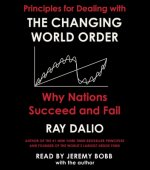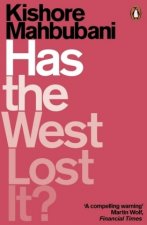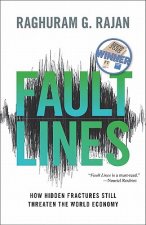
Kód: 04530607
Financial Crises and What to Do About Them
Autor Barry J. Eichengreen
In this accessible book, a leading expert provides a critical assessment of the official sector's efforts to more effectively manage financial crises in emerging markets. Professor Eichengreen reviews international initiatives on ... celý popis
- Jazyk:
 Angličtina
Angličtina - Vazba: Brožovaná
- Počet stran: 206
Nakladatelství: Oxford University Press, 2002
- Více informací o knize

Mohlo by se vám také líbit
Darujte tuto knihu ještě dnes
- Objednejte knihu a zvolte Zaslat jako dárek.
- Obratem obdržíte darovací poukaz na knihu, který můžete ihned předat obdarovanému.
- Knihu zašleme na adresu obdarovaného, o nic se nestaráte.
Více informací o knize Financial Crises and What to Do About Them
Nákupem získáte 172 bodů
 Anotace knihy
Anotace knihy
In this accessible book, a leading expert provides a critical assessment of the official sector's efforts to more effectively manage financial crises in emerging markets. Professor Eichengreen reviews international initiatives on both the crisis prevention and crisis resolution fronts. While crises will always be with us, he concludes that good progress has been made in limiting their spread and strengthening the international financial system. Ironically, however, official-sector initiatives in this area may in fact have made life more difficult for the poorest countries. Initiatives to limit the incidence of crises and threats to the stability of the international financial system should therefore be linked to an increase in development assistance designed to offset the extra burdens on the poorest countries. The other place where official efforts have fallen short is in creating new ways of resolving crises. The author argues that the old way-official sector financing through the International Monetary Fund-is part of the problem, not part of the solution. The Fund's financial operations allow investors to escape without significant losses, which in turn encourages them to lend without regard to the risks, weakening market discipline. Moreover, bailouts are inequitable. Because investors are allowed to exit and the IMF ultimately gets paid back, the residents of the crisis country end up footing the bill. This is one reason why IMF programs have come to be regarded with such animus in the developing world. Imagining that the solution is for the official community to simply show the resolve to resist bailouts is too easy. That the International Monetary Fund has repeatedly come under pressure to extend financial assistance reflects more than a lack of political will; it reflects the inadequacy of the alternatives. At the same time, seeking to create radical new alternatives like an international bankruptcy court is too hard. It would do more to increase the efficiency of resource allocation and the stability of financial markets, the author concludes, to concentrate on more modest changes, namely the introduction of restructuring-friendly provisions into loan agreements, enhancing the capacity of creditors and debtors to resolve debt problems on their own.
 Parametry knihy
Parametry knihy
Zařazení knihy Knihy v angličtině Economics, finance, business & management Economics International economics
1723 Kč
- Plný název: Financial Crises and What to Do About Them
- Autor: Barry J. Eichengreen
- Jazyk:
 Angličtina
Angličtina - Vazba: Brožovaná
- Počet stran: 206
- EAN: 9780199257447
- ISBN: 0199257442
- ID: 04530607
- Nakladatelství: Oxford University Press
- Hmotnost: 282 g
- Rozměry: 216 × 140 × 13 mm
- Datum vydání: 08. August 2002
Oblíbené z jiného soudku
-

Merchants of Grain
526 Kč -

New Confessions of an Economic Hit Man
396 Kč -

Import/Export Kit For Dummies 3e
535 Kč -

Treasure Islands
288 Kč -

International Economics: Theory and Policy, Global Edition
2256 Kč -

Principles for Dealing with the Changing World Order
985 Kč -

Soros on Soros - Staying Ahead of the Curve
848 Kč -

Expert Advisor Programming for Metatrader 4
757 Kč -

Great Rebalancing
388 Kč -

Concise History of International Finance
829 Kč -

Natural Capitalism
407 Kč -

Understanding Ludwig Lachmann's Economics
565 Kč -

Secrets of Temple
555 Kč -

Turbulent and Mighty Continent - What Future for Europe?
673 Kč -

Has the West Lost It?
258 Kč -

Bad Samaritans
309 Kč -

The Road to Ruin
383 Kč -

SuperHubs
298 Kč -

The Competitive Advantage of Nations
904 Kč -

China Shakes The World
258 Kč -

International Economics with MyEconLab
1687 Kč -

Cracking the China Conundrum
1256 Kč -

Export & Import - Winning in the Global Marketplace
1125 Kč -

Import/Export: How to Take Your Business Across Borders
707 Kč -

EuroTragedy
1015 Kč -

Age of Turbulence
433 Kč -

Forex for Ambitious Beginners
516 Kč -

Is the American Century Over?
283 Kč -

Handbook of International Trade and Finance
1322 Kč -

International Trade
2972 Kč -

Managerial Economics in a Global Economy
6571 Kč -

Splendid Exchange
508 Kč -

Fair Trade
270 Kč -

Red Flags
687 Kč -

Transatlantic Defence Procurement
4278 Kč -

Oxford Handbook on The World Trade Organization
1578 Kč -

International Economic Institutions
1542 Kč -

Fault Lines
346 Kč -

International Trade Finance
1978 Kč -

No Ordinary Disruption
368 Kč -

Informal Post-Socialist Economy
1620 Kč -

Economics of the European Union
2680 Kč -

ReORIENT
983 Kč -

Japanese Business Culture and Practices
308 Kč -

Doing Business in Europe
2287 Kč -

Competition Policy
2103 Kč -

Making Globalization Work
283 Kč -

Medieval Trade in the Mediterranean World
1138 Kč -

Fair Trade Revolution
618 Kč
Osobní odběr Praha, Brno a 12903 dalších
Copyright ©2008-24 nejlevnejsi-knihy.cz Všechna práva vyhrazenaSoukromíCookies





 Vrácení do měsíce
Vrácení do měsíce 571 999 099 (8-15.30h)
571 999 099 (8-15.30h)